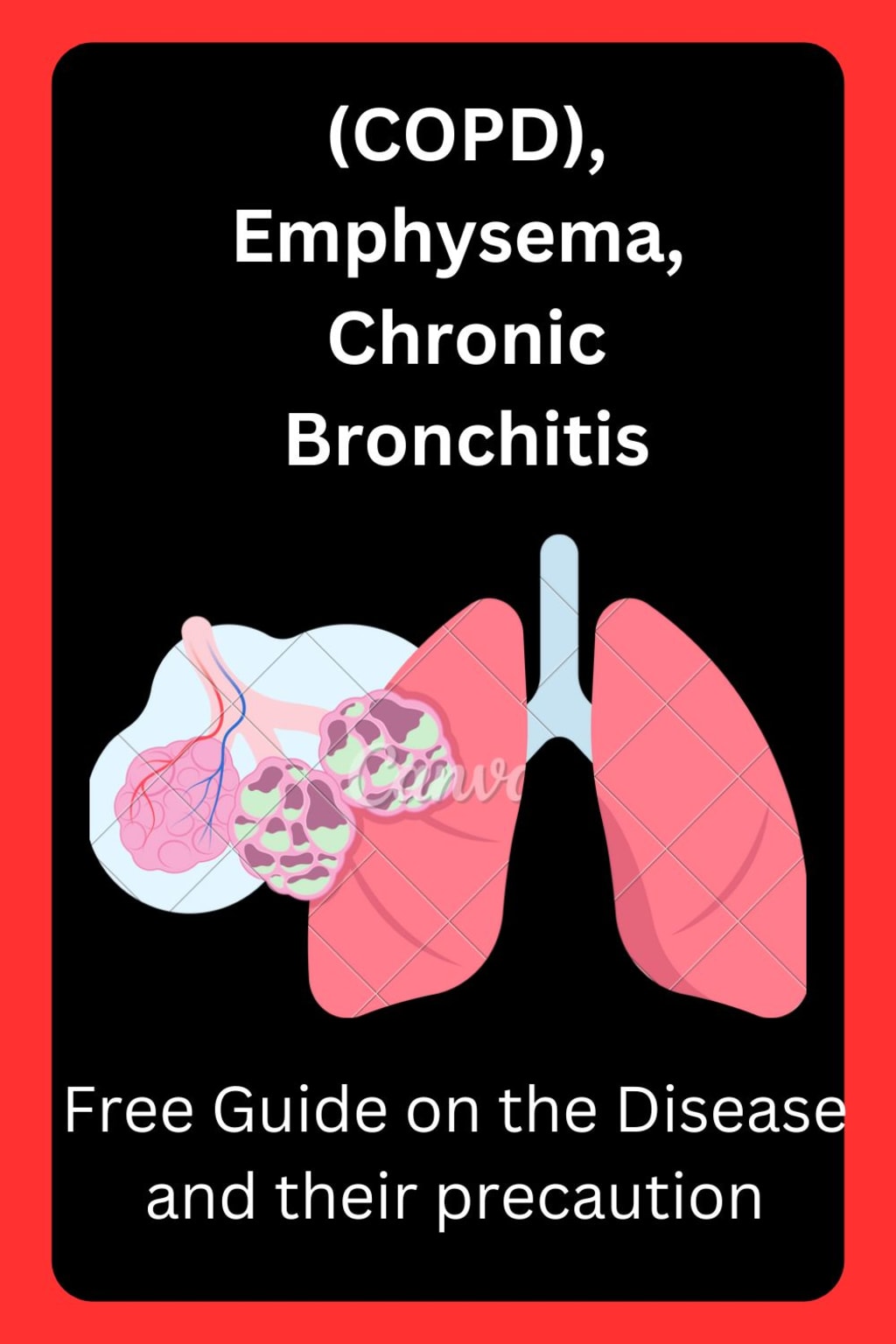Comprehensive Guide to Preventing and Managing Chronic Obstructive Pulmonary Disease (COPD), Emphysema, and Chronic Bronchitis
Chronic Obstructive Pulmonary Disease (COPD), emphysema, and chronic bronchitis are serious respiratory conditions that can significantly affect your quality of life. However, with the right lifestyle changes, preventive measures, and management strategies, you can reduce your risk and manage symptoms effectively. This guide provides proven tips, exercise routines, dietary recommendations, and lifestyle changes to help you stay free from these conditions.

Understanding COPD, Emphysema, and Chronic Bronchitis
What is COPD?
COPD is a group of progressive lung diseases, including emphysema and chronic bronchitis, characterized by increasing breathlessness.
Emphysema
A condition in which the air sacs (alveoli) in the lungs are damaged, leading to breathlessness.
Chronic Bronchitis
A condition where the bronchial tubes become inflamed and produce excessive mucus, leading to coughing and difficulty breathing.
Symptoms
- Shortness of breath
- Chronic cough
- Wheezing
- Frequent respiratory infections
- Fatigue
Risk Factors
- Smoking
- Long-term exposure to lung irritants (e.g., air pollution, chemical fumes, dust)
- Genetic factors (e.g., Alpha-1 antitrypsin deficiency)
- Respiratory infections
Proven Tips to Prevent and Manage COPD, Emphysema, and Chronic Bronchitis
1. Quit Smoking
Smoking is the leading cause of COPD, emphysema, and chronic bronchitis. Quitting smoking is the most effective way to prevent and manage these conditions.
- **Seek Support**: Use smoking cessation programs, support groups, and counseling.
- **Nicotine Replacement**: Consider patches, gum, or lozenges.
- **Medications**: Consult your doctor about medications that can help.
- [Tips to Quit Smoking Video Tutorial](https://www.youtube.com/watch?v=jo8IQx5ZlI8)
2. Avoid Lung Irritants
Minimize exposure to pollutants, chemicals, and other lung irritants to reduce the risk of respiratory issues.
- **Air Quality**: Monitor air quality reports and stay indoors on high pollution days.
- **Protective Gear**: Use masks or respirators if exposed to dust or fumes at work.
- **Ventilation**: Ensure good ventilation in your home and workplace.
- [Air Pollution and Lung Health Video Tutorial](https://www.youtube.com/watch?v=4b_3SJl7AkM)
3. Maintain a Healthy Diet
A balanced diet can support lung health and overall well-being.
- **Antioxidant-Rich Foods**: Berries, nuts, and green leafy vegetables.
- **Healthy Fats**: Omega-3 fatty acids from fish and flaxseeds.
- **Lean Proteins**: Chicken, fish, legumes.
- **Hydration**: Drink plenty of water to keep mucus thin.
- [Healthy Eating for Lung Health Video Tutorial](https://www.youtube.com/watch?v=1U6HcZpBnuE)
4. Regular Exercise
Exercise strengthens the respiratory muscles, improves circulation, and helps maintain a healthy weight.
Recommended Exercises
- **Aerobic Exercise**: Walking, jogging, cycling, or swimming for at least 150 minutes a week.
- [Aerobic Exercise Routine Video Tutorial](https://www.youtube.com/watch?v=5nPJdMwOa3M)
- **Strength Training**: At least two days a week to improve muscle strength and endurance.
- [Beginner Strength Training Video Tutorial](https://www.youtube.com/watch?v=EXt2jLRlaf8)
- **Breathing Exercises**: Techniques such as pursed-lip breathing and diaphragmatic breathing to improve lung function.
- [Breathing Exercises for COPD Video Tutorial](https://www.youtube.com/watch?v=Ined5Q0o2Ng)
5. Regular Health Check-Ups
Regular medical check-ups can help monitor lung health and manage any emerging issues early.
- **Pulmonary Function Tests**: Measure lung capacity and airflow.
- **Imaging Tests**: Chest X-rays or CT scans to detect abnormalities.
- **Vaccinations**: Flu and pneumonia vaccines to prevent respiratory infections.
- [Understanding Medical Check-Ups Video Tutorial](https://www.youtube.com/watch?v=9N9m_FdX4LM)
6. Manage Stress
Stress can exacerbate respiratory symptoms, so managing stress is crucial.
- **Relaxation Techniques**: Practice deep breathing, meditation, or mindfulness.
- **Physical Activity**: Regular exercise can help reduce stress levels.
- **Hobbies**: Engage in activities you enjoy to take your mind off stressors.
- [Stress Management Techniques Video Tutorial](https://www.youtube.com/watch?v=3QG4N5Nsm5E)
7. Avoid Respiratory Infections
Frequent infections can worsen COPD symptoms. Take steps to protect yourself.
- **Hand Hygiene**: Wash your hands regularly and use hand sanitizer.
- **Avoid Sick People**: Stay away from people who are ill.
- **Vaccinations**: Stay up-to-date with vaccinations.
- [Preventing Respiratory Infections Video Tutorial](https://www.youtube.com/watch?v=UBaQKQcq1zo)
8. Use Medications as Prescribed
If diagnosed with COPD, emphysema, or chronic bronchitis, follow your doctor's treatment plan.
- **Bronchodilators**: Help open airways and make breathing easier.
- **Steroids**: Reduce inflammation in the airways.
- **Antibiotics**: Treat respiratory infections promptly.
- [Using Inhalers Correctly Video Tutorial](https://www.youtube.com/watch?v=yOz_Pe5XU-0)
9. Maintain a Healthy Weight
Being overweight can put additional strain on your lungs and respiratory system.
- **Balanced Diet**: Focus on nutrient-dense foods.
- **Regular Exercise**: Engage in physical activity to maintain a healthy weight.
- **Monitor Weight**: Regularly track your weight and adjust your lifestyle as needed.
- [Healthy Weight Management Tips Video Tutorial](https://www.youtube.com/watch?v=GmzW0MIz1lg)
10. Stay Hydrated
Proper hydration helps keep mucus thin and easier to clear from your airways.
- **Water Intake**: Aim for 8-10 glasses of water per day.
- **Humidifiers**: Use a humidifier to keep the air moist, especially in dry environments.
- [Benefits of Staying Hydrated Video Tutorial](https://www.youtube.com/watch?v=3Vg1mXIWegE)
Conclusion
Preventing and managing COPD, emphysema, and chronic bronchitis requires a combination of lifestyle changes, regular medical care, and proactive measures to protect your respiratory health. By quitting smoking, avoiding lung irritants, maintaining a healthy diet, exercising regularly, managing stress, and staying hydrated, you can significantly reduce your risk and improve your quality of life.
Always consult with healthcare professionals to tailor a prevention and management plan that suits your individual needs and health conditions. Stay informed, stay active, and take proactive steps towards better respiratory health.
**Note**: This guide is for educational purposes only and should not replace professional medical advice.
About the Creator
Enjoyed the story? Support the Creator.
Subscribe for free to receive all their stories in your feed. You could also pledge your support or give them a one-off tip, letting them know you appreciate their work.






Comments
There are no comments for this story
Be the first to respond and start the conversation.